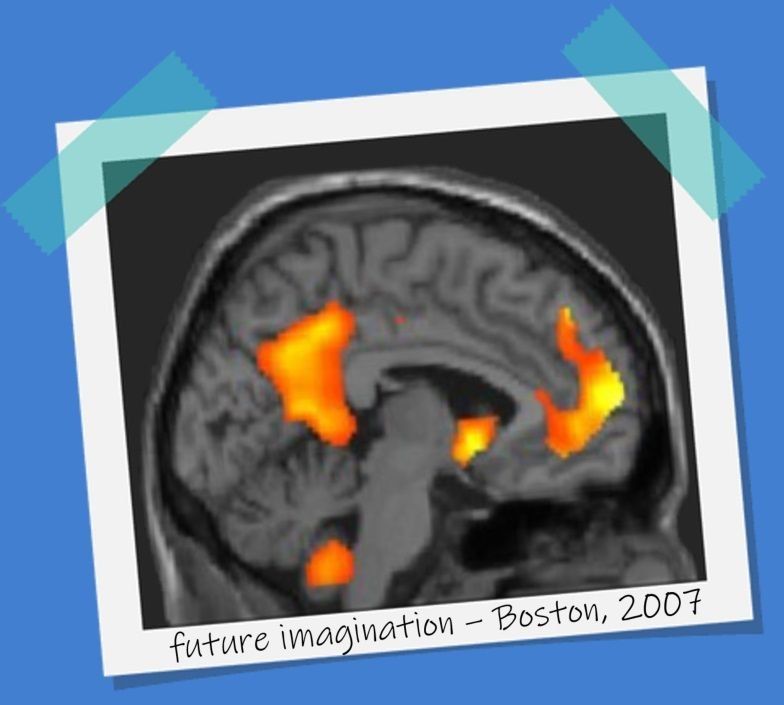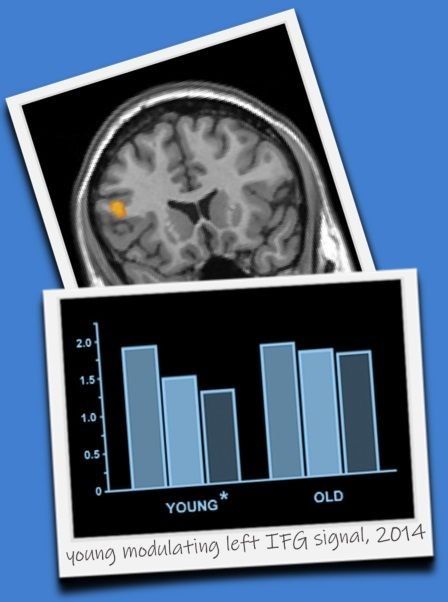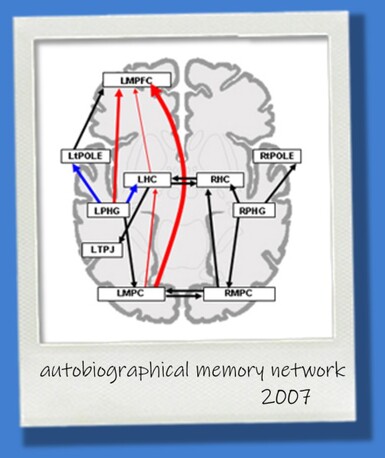remembering the past
A big focus at the Memory Lab is to discover how we remember the past in rich detail. The hippocampus is crucial to this process: more vividly detailed memories are associated with higher levels of hippocampal activity and hippocampal damage results in reduced episodic detail.
The hippocampus doesn't work in isolation, and is part of a whole-brain network supporting AM retrieval. We've have found that distinct parts of this network are associated with different types of memory (e.g., specific vs. general AMs) and different "routes" to memory (e.g., generative vs. direct retrieval).
imagining the future
In 2007, we reported that imagining the future engaged the same neural network as remembering the past. This finding was one of three studies on imagination published that year that propelled future events into the field of memory research. Since then, we have found that behavioural and neural changes in past events are also evident for imagined events in healthy older adults; we have also reported similar parallel changes in Alzheimer's disease.

More recently we have found that in depression, imagining the future appears to be more affected than remembering the past. This finding, along with increased hippocampal activity, suggest that future simulation is a more intensive process than remembering - perhaps reflecting the fact that future events are novel constructions that require encoding. More recently, we have begun to explore other factors that contribute to imagination, including the familiarity of details from episodic memory and creativity, as well as the ways in which imagination can affect memory accuracy.
memory and identity
Using methods from neuropsychology and social psychology, we have examined the impact of AM loss on identity in Alzheimer's disease. This study revealed that loss of early memories (late childhood/early adulthood) had the most significant effects on the strength and quality of identity, even when controlling for general cognitive decline. These results prompted us to consider how episodic and semantic aspects of AM contribute to the content and continuity of identity, and we proposed a distinction between narrative and phenomenological forms of self-continuity. More recently, we have developed a novel framework that maps two dimensions of self (subjective/objective and present/temporally-extended) onto semantic and episodic aspects to AM.
the aging brain
Woven through all of our research is an interest in how the brain and cognition changes in healthy aging and age-related brain disorders. We have explored changes in future simulation in healthy aging, Alzheimer's disease and semantic dementia. With respect to memory, we have examined age-related changes in brain activity when encoding verbal information, emotional images and emotional scenes.
We have also found ways in which memory decline can be mitigated. With collaborators at Macquarie University, we found older adults retrieve more detail about past experiences when remembering with their spouse.

In a current work on aging, we are examining whether differences in brain variability underpin changes in cognition. We are also using fMRI to understand why the ability to recognize some emotions (e.g., fear) is reduced in older age while other emotions (e.g., disgust) is relatively preserved.
research methods + tools
SciToS Autobiographical Interview Scoring (AIS)
Much of our behavioural research involves scoring of autobiographical narratives, including memories (e.g., past events), imaginings (e.g., future events), and life stories. In 2015, we worked with SciToS (Scientific Tool Set) to develop a module for their software package that digitises narrative scoring methods such as the Autobiographical Interview (Levine et al., 2002).
The SciToS Autobiographical Interview Scoring (AIS) Module can be used for:
- Segmentation: Parse narratives into discrete textual units
- Scoring: Classify textual units with customized tags that can be organised into categories and colour coded
- Tallying: Count the number of units per tag, tag category, condition, participant
- Organising: Scored narratives for entire studies can be stored in an organised manner
- Exporting: Data can be exported in various file formats
The latest release of SciToS is freely available on GitHub, along with an AIS wiki and FAQ. Please cite the tool as follows:
- Wickner, C., Englert, C., Addis, D.R. (2015). Developing a tool for Autobiographical Interview scoring. KiwiCAM Conference, Wellington, New Zealand.
- SciToS AIS module [Computer software]. (2015). Retrieved from "https://github.com/scientific-tool-set"


